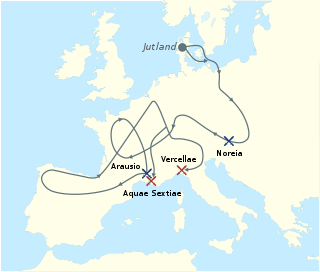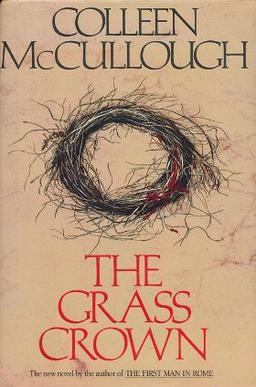
Year 100 BC was a year of the pre-Julian Roman calendar. At the time it was known as the Year of the Consulship of Marius and Flaccus and the First Year of Tianhan. The denomination 100 BC for this year has been used since the early medieval period, when the Anno Domini calendar era became the prevalent method in Europe for naming years.

This article concerns the period 109 BC – 100 BC.

Gaius Marius was a Roman general and statesman. Victor of the Cimbric and Jugurthine wars, he held the office of consul an unprecedented seven times. Rising from a family of smallholders in a village called Ceraetae in the district of Arpinum, Marius acquired his initial military experience serving with Scipio Aemilianus at the Siege of Numantia in 134 BC. He won election as tribune of the plebs in 119 BC and passed a law limiting aristocratic interference in elections. Barely elected praetor in 115 BC, he next became the governor of Further Spain where he campaigned against bandits. On his return from Spain he married Julia, the aunt of Julius Caesar.
Quintus Lutatius Catulus was a consul of the Roman Republic in 102 BC. His consular colleague was Gaius Marius. During their consulship the Cimbri and Teutones marched south again and threatened the Republic. While Marius marched against the Teutones in Gaul, Catulus had to keep the Cimbri from invading Italy. In this he failed; the Cimbri succeeded in invading the Po Valley. In 101 BC Catulus, as proconsul, continued the war against the Cimbri. Marius, elected consul for the fifth time, joined him and together they campaigned against the Germanic invaders in the Po Valley. At the Battle of Vercellae Marius and Catulus decisively defeated the Cimbri and ended the Germanic invasion. After Vercellae the two feuded, and Catulus consequently committed suicide following Marius's victory in the civil war of 87 BC.
Lucius Appuleius Saturninus was a Roman populist and tribune. He is most notable for introducing a series of legislative reforms, alongside his associate Gaius Servilius Glaucia and with the consent of Gaius Marius, during the last years of the second century BC. Senatorial opposition to these laws eventually led to an internal crisis, the declaration of the senatus consultum ultimum, and the deaths of Saturninus, Glaucia, and their followers in 100 BC.
Marcus Aemilius Scaurus was a Roman statesman who served as consul in 115 BC. He was also a long-standing princeps senatus, occupying the post from 115 until his death in late 89 or early 88 BC, and as such was widely considered one of the most prestigious and influential politicians of the late Republic.
Masters of Rome is a series of historical novels by Australian author Colleen McCullough, set in ancient Rome during the last days of the old Roman Republic; it primarily chronicles the lives and careers of Gaius Marius, Lucius Cornelius Sulla, Pompey the Great, Gaius Julius Caesar, and the early career of Caesar Augustus. It spans from January 1, 110 BC through to January 16, 27 BC.
Publius Rutilius Rufus was a Roman statesman, soldier, orator and historian of the Rutilia gens, as well as a great-uncle of Gaius Julius Caesar. He achieved the highest political office in the Roman Republic when he was elected consul in 105 BC.

The Battle of Arausio took place on 6 October 105 BC, at a site between the town of Arausio, now Orange, Vaucluse, and the Rhône river, where two Roman armies, commanded by proconsul Quintus Servilius Caepio and consul Gnaeus Mallius Maximus, were heavily defeated after clashing with the migratory tribes of the Cimbri under Boiorix and the Teutons under Teutobod.
Quintus Caecilius Metellus Numidicus was an ancient Roman statesman and general. He was a leader of the Optimates, the conservative faction of the Roman Senate. He was a bitter political opponent of Gaius Marius. He was consul in 109 BC; in that capacity he commanded the Roman forces in Africa during the Jugurthine War. In 107 BC, he was displaced from his command by Marius. On his return he was granted a triumph and the agnomen Numidicus. He later became a censor, entering into exile in opposition to Marius. Metellus Numidicus enjoyed a reputation for integrity in an era when Roman politics was increasingly corrupt.
Quintus Servilius Caepio was a Roman statesman and general, consul in 106 BC, and proconsul of Cisalpine Gaul in 105 BC. He was the father of Quintus Servilius Caepio and the grandfather of Servilia.
Quintus Caecilius Metellus Pius was a general and statesman of the Roman Republic. His father Metellus Numidicus was banished from Rome through the machinations of Gaius Marius. He, because of his constant and unbending attempts to have his father officially recalled from exile, was given the agnomen (nickname) Pius.
Publius Servilius Vatia Isauricus, was a politician and general of the Roman Republic and a member of the plebeian branch of the gens Servilii. He was elected consul for 79 BC with Appius Claudius Pulcher as his consular collegae. From 78 to 74 BC, as proconsul of Cilicia, he fought against the Cilician Pirates and Isaurian hill tribes in Asia Minor. He was granted the agnomen Isauricus for his victories over the Isaurians. Upon returning to Rome he celebrated a triumph for his victories.
Lucius Julius Caesar was a Roman statesman and general of the late 2nd and early 1st centuries BC. He was involved in the downfall of the plebeian tribune Lucius Appuleius Saturninus in 100 BC. He was consul of the Roman Republic in 90 BC during the Social War. During the war he commanded several Roman legions against the Italian Allies. He was awarded a Triumph for his victories on the Samnites at Acerrae.
Quintus Servilius Caepio was a Roman patrician, statesman and soldier. He was the son of Quintus Servilius Caepio who was consul in 106 BCE and who lost his army during the Battle of Arausio. He was elected praetor some time in the last 90s BC and fought for Rome during the Social War. He was killed in the second year of the war while fighting the Marsi by Quintus Poppaedius Silo.

The Grass Crown is the second historical novel in Colleen McCullough's Masters of Rome series, published in 1991.
Mamercus Aemilius Lepidus Livianus was a Roman politician and military commander who was consul in 77 BC.
Julia, or possibly Ilia, was a Roman noblewoman who was the first wife of Sulla, later a Roman dictator.
The career of Julius Caesar before his consulship in 59 BC was characterized by military adventurism and political persecution. Julius Caesar was born on 12 July 100 BC into a patrician family, the gens Julia, which claimed descent from Iulus, son of the legendary Trojan prince Aeneas, supposedly the son of the goddess Venus. His father died when he was just 16, leaving Caesar as the head of the household. His family status put him at odds with the Dictator Lucius Cornelius Sulla, who almost had him executed.




